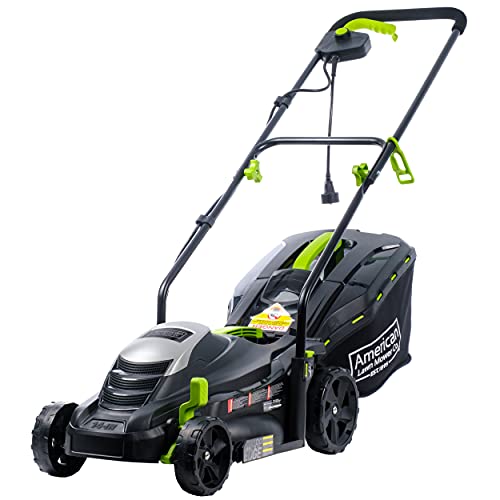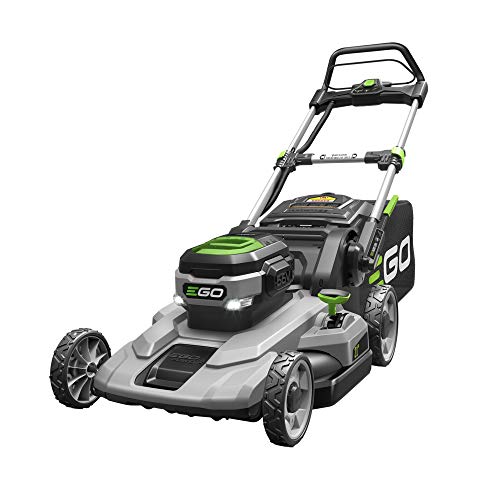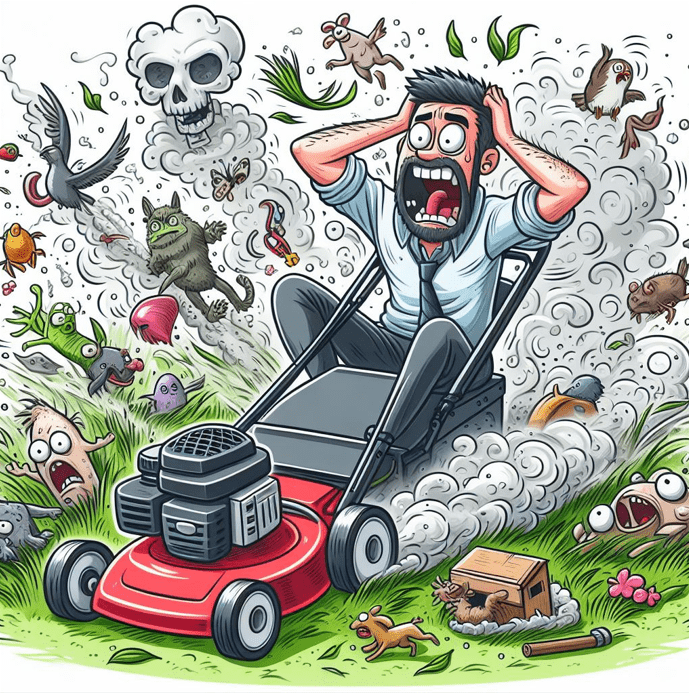
We’ve all seen (or maybe even experienced) those funny lawn mower fails. From runaway mowers to forgetting the rake is in the path, there’s no shortage of cringeworthy moments. But fear not, lawn care warriors! This guide will equip you with the knowledge to keep your mower running smoothly and avoid becoming the next viral mishap.
The Heart of Your Lawn’s Health
Lawnmowers are vital for maintaining the aesthetics and health of your lawn. However, they can encounter various issues that hinder their performance. This article delves into these problems, offering solutions and preventive measures to keep your lawn mower in top condition.
Understanding Lawn Mower Mechanics
Before tackling common issues, it’s essential to grasp how lawnmowers work. Whether you own a push, riding, electric, or gas-powered mower, understanding its mechanics is the first step to effective troubleshooting.
The Basics of Lawn Mower Operation
Lawnmowers operate on simple principles, cutting grass with blades powered by electricity or a combustion engine. Knowing the basics can help diagnose issues more accurately.
Types of Lawn Mowers
Each type of lawn mower, from manual push mowers to sophisticated riding models, has unique maintenance needs. Recognizing your mower’s type is crucial for appropriate care. Here’s a quick guide to the most common types:
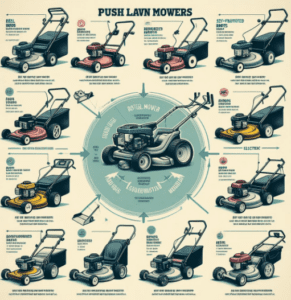
-
Push Mowers: These require manual operation and are ideal for smaller lawns.
Push mowers, the classic option for keeping your lawn tidy, require manual operation and offer distinct advantages and disadvantages compared to their powered counterparts. Here’s a breakdown to help you decide if a push mower is the right fit for your needs:
Pros:
- Low Cost: Push mowers are significantly cheaper than electric or gas-powered ones. They require minimal maintenance, further reducing long-term expenses.
- Environmentally Friendly: Push mowers operate without electricity or gasoline, producing zero emissions. They’re a quiet and eco-friendly choice for your lawn and the environment.
- Exercise and Fresh Air: Mowing your lawn becomes a light workout, providing some training and a chance to breathe fresh air while working.
- Lightweight and Maneuverable: Push mowers are much lighter than powered mowers, making them easier to maneuver around obstacles and tight spaces in your lawn.
- Quieter Operation: Compared to the loud engines of gas mowers, push mowers operate silently, allowing you to mow without disturbing your neighbors or wildlife.
- No Gas or Oil Hassles: No need to worry about buying, storing, or refilling gas or oil.
- Simple Maintenance: Maintaining a push mower is straightforward. Regular cleaning and occasional blade sharpening are the primary upkeep tasks.
Cons:
- Manual Effort: Mowing requires physical exertion, which can be tiring for large lawns or those with mobility limitations.
- Limited Area Coverage: Push mowers are best suited for smaller lawns. Mowing a large area with a push mower can be time-consuming and physically demanding.
- Uneven Cuts on Uneven Terrain: Maintaining a consistently even cut can be challenging on uneven or hilly terrain.
- Weather Dependence: Mowing becomes difficult or impossible during wet weather conditions.
- Limited Functionality: Unlike powered mowers, push mowers don’t offer features like bagging clippings or mulching.
Who should consider a Push Mower?
Push mowers are an excellent choice for:
- Small Lawns: Ideal for homeowners with compact lawns where maneuverability is more important than speed.
- Eco-Conscious Users: Perfect for those who prioritize environmentally friendly lawn care.
- People Looking for Exercise: An excellent way to get some light exercise while tending to your lawn.
- Budget-Minded Buyers: The most affordable lawnmower option, with minimal ongoing maintenance costs.

-
Riding Mowers: Offer a comfortable ride for larger properties.
Riding mowers are the ultimate time-savers for maintaining expansive lawns. They offer a comfortable ride and increased efficiency compared to push mowers. However, they also come with their own set of advantages and disadvantages. Let’s explore both sides to help you decide if a riding mower fits your lawn.
Pros:
- Comfort and Convenience: Riding mowers provide a comfortable seat and steering wheel control, making mowing large areas less strenuous and much faster.
- Increased Efficiency: You can cover significantly more ground in a shorter time than a push mower, saving you valuable time and effort.
- Suitable for Large Lawns: Designed to handle expansive areas efficiently, making them ideal for properties with large lawns.
- Variety of Features: Many riding mowers offer additional features like bagging or mulching grass clippings, saving you time and effort on yard waste disposal.
- More Powerful Engines: Riding mowers typically have more powerful engines than push mowers, allowing them to tackle thicker grass and uneven terrain more effectively.
Cons:
- Higher Cost: Riding mowers are a significant investment compared to push mowers. The initial purchase price and ongoing maintenance costs can be higher.
- Storage Requirements: They require more storage space than push mowers due to their larger size.
- Less Maneuverable: While easier to operate than push mowers, they can be less maneuverable in tight spaces or around obstacles. It is not ideal for very small or intricately landscaped lawns.
- Safety Concerns: Riding mowers requires caution, especially on slopes or uneven terrain. Always follow safety precautions and familiarize yourself with the controls before use.
- Maintenance Needs: Riding mowers require more regular maintenance than push mowers, including oil changes, filter replacements, and blade sharpening.
Who should consider a Riding Mower?
Riding mowers are an excellent choice for:
- Large Lawns: Homeowners with expansive lawns who want to save time and effort on mowing.
- Those with Physical Limitations: People who may find pushing a mower rugged due to physical limitations can benefit from the comfort and ease of operation offered by riding mowers.
- Those Who Value Efficiency: A riding mower can significantly reduce mowing time for those who prioritize speed and efficiency in lawn care.
- Users Who Want Additional Features: If bagging or mulching clippings is essential, some riding mowers offer these convenient features.

-
Electric Mowers: Quieter and more environmentally friendly, but may have power limitations for extensive areas.
Electric mowers are gaining popularity for their quiet operation and eco-friendly approach to lawn care. However, they also have limitations compared to gas-powered mowers. Let’s delve into the advantages and disadvantages to help you decide if an electric mower is sustainable for your lawn.
Pros:
- Quieter Operation: Electric mowers are significantly quieter than gas-powered mowers, creating a more peaceful mowing experience for you and your neighbors.
- Environmentally Friendly: They produce zero emissions, making them a sustainable choice for eco-conscious homeowners. No fumes or harmful pollutants released during operation.
- Lower Maintenance: Electric mowers generally require less maintenance than gas-powered mowers—no need to change spark plugs, oil, or air filters.
- Lightweight and Maneuverable: Electric mowers are typically lighter than gas mowers, making them easier to maneuver around obstacles and tight spaces in your lawn.
- Easy Starting: No need to pull a cord or deal with complex starting procedures. Electric mowers typically have a simple push-button start for effortless operation.
Cons:
- Power Limitations: Electric mowers may not have the same power as gas-powered mowers. They might struggle with thicker grass, uneven terrain, or large lawns.
- Runtime Limitations: Electric mowers are limited by battery life. You may need to recharge the battery mid-mow for larger lawns, potentially interrupting your mowing session.
- Corded vs. Cordless: Corded electric mowers offer unlimited runtime but restrict your movement due to the cord length. Cordless mowers offer more freedom but require battery recharging.
- Higher Initial Cost: Electric mowers may have a higher initial purchase price than gas-powered mowers, although ongoing maintenance costs are lower.
- Limited Features: Some electric mowers may have fewer features than gas-powered models, such as bagging or mulching capabilities.
Who should consider an Electric Mower?
Electric mowers are an excellent choice for:
- Small to Medium Lawns: Ideal for homeowners with well-maintained, smaller to medium-sized lawns where power isn’t a major concern.
- Eco-Conscious Users: Perfect for those who prioritize environmentally friendly lawn care practices.
- Noise-Sensitive Areas: For those in neighborhoods with noise restrictions or who prefer a quieter mowing experience.
- People Who Value Convenience: Easy starting and lower maintenance make electric mowers convenient.
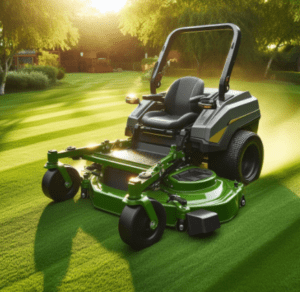
- Zero-Turn Mowers: Highly maneuverable for tight spaces.
Zero-turn mowers are known for their incredible maneuverability, making them popular for navigating tight spaces and intricate landscapes. However, they come with their own set of advantages and disadvantages compared to traditional riding mowers. Let’s explore both sides to help you decide if a zero-turn mower fits your lawn.
Pros:
- Unmatched Maneuverability: Zero-turn mowers can turn on a dime, making them ideal for navigating around obstacles, flower beds, and tight corners with ease. This is a significant advantage for complex or oddly shaped lawns.
- Increased Efficiency: Their tight turning circles allow you to mow around obstacles efficiently, potentially reducing mowing time compared to traditional riding mowers.
- Time Savings on Complex Lawns: The ability to maneuver around obstacles eliminates the need for constant stopping and starting, saving you time on intricate lawns.
- Faster Mowing Speeds: Zero-turn mowers typically offer higher mowing speeds than traditional riding mowers, increasing efficiency for larger lawns.
- Variety of Cutting Widths: Available in a range of cutting deck widths, you can choose a zero-turn mower that best suits the size and complexity of your lawn.
Cons:
- Higher Cost: Zero-turn mowers are generally more expensive than traditional riding mowers due to their advanced turning mechanism.
- Learning Curve: Operating a zero-turn mower requires practice to master the controls and tight turning maneuvers.
- Less Stable on Slopes: Their zero-turn capability can make them less stable on slopes compared to traditional riding mowers with a steering wheel. Use caution on uneven terrain.
- Rougher Ride: The turning mechanism can sometimes be bumpier than traditional riding mowers.
- May Not Be Ideal for Open Areas: While excelling in tight spaces, zero-turn mowers might not offer the same straight-line comfort and control as traditional riding mowers for extensive open areas.
Who should consider a Zero-Turn Mower?
Zero-turn mowers are an excellent choice for:
- Lawns with Tight Spaces: Homeowners with properties with obstacles, flower beds, or intricate landscaping require precise maneuvering.
- Large, Complex Lawns: The time-saving efficiency of navigating obstacles makes them ideal for maintaining large, complex lawns.
- Those Who Value Efficiency: A zero-turn mower can significantly reduce mowing time for those who prioritize speed and efficiency in mowing intricate lawns.
- Landscapers and Professionals: The maneuverability and efficiency of zero-turn mowers make them popular choices for professional landscapers.
Importance of Regular Maintenance
Why Regular Maintenance is Crucial for Your Lawn Mower
Just like a well-maintained car runs smoother and lasts longer, so too does a lawn mower that receives regular care. Here’s a deeper dive into why regular maintenance is vital for keeping your lawn mower happy and your lawn looking its best:
Prevents Breakdowns and Costly Repairs
Regular maintenance catches small issues before they snowball into major problems. Worn blades, clogged filters, and low oil levels can lead to breakdowns that require expensive repairs or even mower replacements. Proactive maintenance is significantly cheaper than reactive repairs.
Extends the Lifespan of Your Mower
By caring for your mower, you’re investing in its longevity. Regular maintenance helps all the mower’s components function optimally, reducing wear and tear and extending the mower’s overall lifespan. This translates to getting more years of reliable service from your mower before replacing it.
Optimizes Performance and Efficiency
A well-maintained mower runs better. Sharp blades deliver a clean, crisp cut, while clean filters ensure proper airflow and fuel efficiency. This translates to a smoother mowing experience with less strain on the engine, leading to better fuel economy and a cleaner overall cut for your lawn.
Maintains Safety
Regular maintenance isn’t just about performance, it’s also about safety. Loose parts, dull blades, and faulty brakes can all pose safety hazards while mowing. Checking these components regularly ensures safe operation and minimizes the risk of accidents.
Reduces Emissions and Environmental Impact
A poorly maintained mower with clogged filters and a dirty engine runs inefficiently and produces more emissions. Regular maintenance helps your mower burn fuel more efficiently, reducing harmful emissions and minimizing environmental impact.
Peace of Mind and Predictability
Knowing your mower has been adequately maintained gives you peace of mind when it’s time to tackle your lawn. You can mow confidently, knowing you’re less likely to encounter unexpected breakdowns or performance issues.
Maintaining Your Investment
Your lawn mower is an investment. Regular maintenance keeps your mower running smoothly and protects your investment. By caring for your mower, you’re ensuring it retains its value and lasts for years.
It’s Easier Than You Think
Many regular maintenance tasks can be done at home with minimal tools and following your user manual. Simple tasks like cleaning the mower deck, sharpening blades, and checking oil levels can significantly improve your mower’s performance and lifespan.
Quick Tip: Create a checklist or refer to your user manual for a customized maintenance schedule.
Problem 1: Difficulty in Starting the Lawn Mower
One of the most frustrating issues is a lawn mower that won’t start. Let’s explore the reasons and solutions.
Common Causes and Solutions
Old fuel, a faulty spark plug, or a clogged carburetor can prevent your mower from starting. Regular checks and timely replacement of parts can mitigate these issues.
Preventive Tips
Using fresh fuel, regularly changing the oil, and keeping the carburetor clean are essential steps to prevent starting problems.
Problem 2: Lawn Mower Overheating
Overheating can damage your lawn mower’s engine. Understanding why it happens is key to prevention.
Recognizing Overheating Symptoms
A scorching engine, smoke, or a burning smell are clear indicators of overheating. Immediate action is necessary to prevent damage.
Overheating Solutions
Cleaning the cooling fins, ensuring proper oil levels, and avoiding overuse during hot days can help prevent overheating.
Problem 3: Uneven Cutting
Uneven cutting can leave your lawn looking patchy and unkempt.
Causes and Fixes
Dull blades or incorrect wheel height settings are common culprits. Regular blade sharpening and adjustment of wheel height can resolve this.
Maintenance for Consistent Performance
Regular blade checks and adhering to a maintenance schedule ensure consistent cutting performance.
Problem 4: Excessive Vibration
Excessive vibration is not only annoying but also harmful to your mower.
Identifying Causes
Unbalanced blades or loose parts often cause excessive vibration. Regular inspections can help identify these issues early.
Rectifying Vibrations
Balancing blades and tightening any loose components are effective ways to reduce vibrations.
Problem 5: High Fuel or Oil Consumption
A lawn mower using too much fuel or oil is inefficient and costly.
Troubleshooting High Consumption
Leaky fuel lines or an overfilled oil chamber can lead to high consumption. Regular inspections can catch these issues early.
Efficient Operation Practices
Using the correct type of fuel and oil and avoiding overfilling can lead to more efficient operation.
Advanced Maintenance Tips
Beyond the basics, advanced maintenance can significantly improve your lawn mower’s longevity and performance.
Regular Maintenance Schedule
Creating and adhering to a maintenance schedule is key to keeping your lawn mower in optimal condition. Here’s a sample schedule to get you started (consult your user manual for specific recommendations):
- Spring: Check and replace the spark plug, air filter, and oil. Sharpen blades.
- Summer: Clean grass clippings
- Fall: Check and top off engine oil. Clean underneath the mower deck.
- Winter (Storage): Drain fuel and oil (consult your user manual for proper disposal methods). Disconnect the spark plug wire. Store the mower in a clean, dry place.
DIY vs. Professional Servicing
While many maintenance tasks can be done at home with the help of your user manual and some basic tools, some may require professional servicing. Knowing when to seek professional help is crucial.
Here are some signs it’s time to call a pro:
- Complex repairs beyond your skillset or comfort level.
- Engine rebuilds.
- Electrical system issues.
Seasonal Maintenance Advice
Seasonal changes affect your lawn mower’s maintenance needs. Preparing your mower for different seasons ensures its readiness and efficiency. Refer to the sample schedule above for specific seasonal tasks.
Safety Precautions While Using Lawn Mowers
Safety should always be a priority when operating lawnmowers.
Essential Safety Tips
- Wear appropriate protective gear, including eye protection, gloves, and sturdy footwear.
- Be aware of your surroundings, especially children and pets, and keep them at a safe distance while mowing.
- Never leave a running mower unattended.
- Read the user manual carefully and follow the instructions for safe operation, including starting, stopping, and maneuvering the mower.
- Avoid mowing on slopes or uneven terrain that could cause tipping.
- Refuel the mower in a well-ventilated area with the engine off, and wipe up any spills immediately.
The Importance of User Manuals
As explained above, always refer to your user manual for specific safety instructions and maintenance recommendations for your lawn mower model.
Conclusion: Keeping Your Lawn Mower Healthy
We’ve explored the most common lawn mower problems and their solutions. Regular maintenance and awareness are critical to a long-lasting, efficient lawn mower. Remember, a healthy mower means a healthy lawn and a frustration-free mowing experience!
Quick Tips:
- Keep your mower clean after each use to prevent rust and buildup.
- Store your mower in a dry, protected area.
- Sharpen your blades regularly for a clean cut.
- Use the right fuel and oil for your mower model.
Some of the Best Sellers Of Lawn Mowers On Amazon
Last update on 2024-07-26 / Affiliate links / Images from Amazon Product Advertising API






















